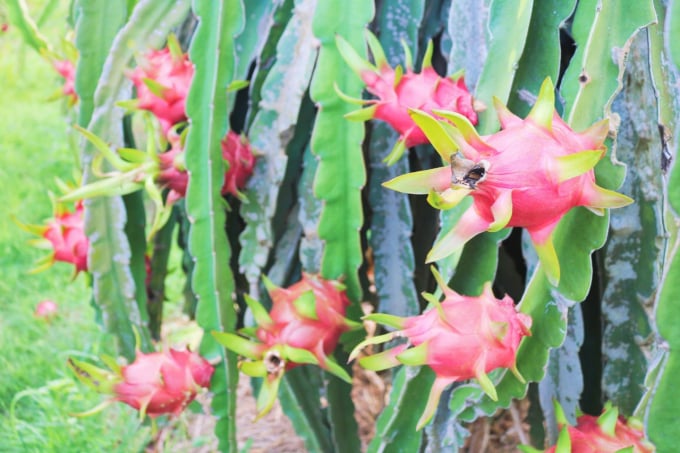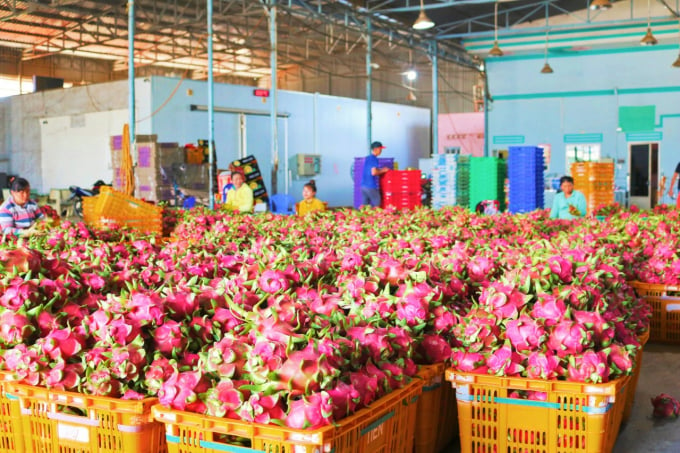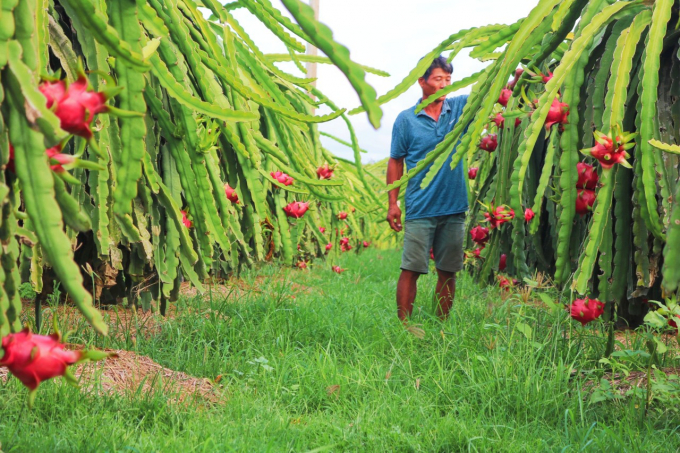December 30, 2025 | 20:59 GMT +7
December 30, 2025 | 20:59 GMT +7
Hotline: 0913.378.918
December 30, 2025 | 20:59 GMT +7
Hotline: 0913.378.918
The Vietnamese Embassy in Japan has just announced that Japan has officially granted a Geographical Indication Certificate for Binh Thuan dragon fruit. After more than 3 years of filing, Binh Thuan dragon fruit has become the second Vietnamese product after Luc Ngan lychee to be granted a Geographical Indication Certificate in Japan.

Binh Thuan dragon fruit has been granted a Geographical Indication Certificate in Japan. Photo: KS.
According to Mr. Phan Van Tan, Deputy Director of Binh Thuan Department of Agriculture and Rural Development, this fact means affirming the prestige of Binh Thuan dragon fruit in the Japanese market. There will be many more opportunities to promote and expand the export market for Binh Thuan dragon fruit.
Meanwhile, Mr. Bien Tan Tai, Deputy Director of Binh Thuan Department of Industry and Trade, said that this is only the first step to create a competitive advantage for dragon fruit in this market. The Binh Thuan Department of Industry and Trade will therefore assume the prime responsibility and coordinate with relevant units to implement a number of solutions in promoting the dragon fruit exportation to the Japanese market in the near future.

The fact that Binh Thuan dragon fruit has just been granted a Geographical Indication Certificate in Japan will open up many new opportunities for dragon fruit exports to other demanding markets. Photo: KS.
As stated by Mr. Bian Tan Tai, Japan is a strict market. Dragon fruit must be produced according to VietGAP and GlobalGAP standards, weighing 300 grams or more. Products must also comply with Japan's environmental sanitation law and go through animal and plant quarantine steps before entering this demanding market.
The entire consignment is treated with hot steam (heating) to eliminate fruit flies and increase product quality. All processing procedures are closely monitored by experts from Japan and Vietnam.

Dragon fruit garden in Binh Thuan producing in accordance with VietGAP standards. Photo: KS.
However, Binh Thuan province has yet an enterprise that directly exports dragon fruits to the Japanese market. The fruits are mainly sold to enterprises outside the province to process on demand and then export to Japan.
The province has more than 16,000 ha of dragon fruit recognized to meet VietGAP standards and more than 500 hectares of production according to GlobalGAP standards at the moment. According to Binh Thuan Department of Agriculture and Rural Development, the GAP-certified dragon fruit area in the province must reach 70% (over 20,000 ha) by 2025.
In order to achieve this goal, the agricultural sector will focus on communicating and supporting dragon fruit growers to transform production towards quality improvement; further usage and management of planting area codes; application of production procedures in the direction of VietGAP, GlobalGAP, food safety, HACCP, and organic farming. Binh Thuan Department of Agriculture and Rural Development will also guide cooperatives and businesses to equip product identification and traceability systems to perfect production (using QR Code stamps, electronic diary software, etc.).
According to Binh Thuan Department of Industry and Trade, the main export markets of Binh Thuan dragon fruit in Asia at the moment include Hong Kong, Taiwan, China, the Philippines, Korea, Singapore, Thailand, Malaysia, Myanmar, Indonesia, Qatar, India, and United Arab Emirates (UAE). Germany, Netherlands, Russia, Spain, Canada, USA, Australia, New Zealand are also considered major export markets for Binh Thuan’s dragon fruit.
In the first nine months of 2021, the whole province has harvested over 532,000 tons of dragon fruit and is expected to harvest about 250,000 tons in the remaining three months of the year.
Translated by Samuel Pham
/2025/12/25/2157-2-170845_745.jpg)
(VAN) Amid the impacts of climate change and market competition, An Giang's agriculture is shifting toward a green, modern growth model, creating a key driving force for restructuring the sector.

(VAN) Two leading enterprises in the agricultural sector have officially cooperated to implement a sustainable value chain model for Viet Nam's shrimp industry.

(VAN) Dien Bien is speeding up ODA projects to respond to climate change and strengthen water management and disaster prevention infrastructure in pursuit of sustainable development.

(VAN) With high automation, large capacity, and a green development orientation, the Hai Duong Plant Branch is becoming an important anchor for the animal feed market.
/2025/12/01/2936-2-222331_70.jpg)
(VAN) Mortgaging his house and giving up a pharmaceutical management career, Mr. Nguyen Quang Duy succeeded in bringing Khanh Hoa's sea grapes to demanding markets such as Japan and the U.S.

(VAN) The large-scale agroforestry investment project aims to develop a leading sustainable agro-industrial center in Angola.
/2025/11/28/3433-1-212821_213.jpg)
(VAN) Many localities across the coconut land of Vinh Long are replicating emission-reducing models in production and daily life, contributing to the targets for emission reduction and green economic development.